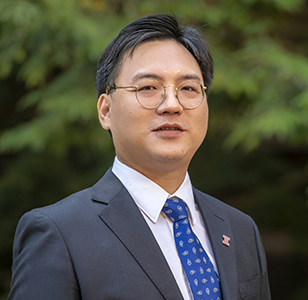
Oct 18, 2022 2022-10 Business Administration Faculty Research in Education
Understanding the rise of non-banking lenders in the GSE Mortgage Market
Since 2010, Quicken Loans and other lenders outside the traditional banking world have been carving out a larger piece of the government-sponsored enterprise (GSE) mortgage pie. And for the first few years, it seemed like there was an obvious reason why. “When you control for the mortgage origination variables that were publicly available, non-banks offered lower interest rates than banks,” says incoming clinical assistant professor Zilong Liu. In 2013, however, that trend reversed. Yet their growth continued unabated. And as someone with a lot of experience in the financial market, Liu wanted to understand why.
 Since 2015, Liu has been a quantitative/modeling analyst developing and validating operational risk models for some of the world’s largest financial companies, including PNC, KeyBank and Discover. Liu likes models, because they’re predictable. But what he saw happening in the GSE mortgage market didn’t seem to add up. If non-banks were charging more interest than their traditional counterparts, it would seem logical that they would lose market share. So, how did their sales growth continue to defy logic?
Since 2015, Liu has been a quantitative/modeling analyst developing and validating operational risk models for some of the world’s largest financial companies, including PNC, KeyBank and Discover. Liu likes models, because they’re predictable. But what he saw happening in the GSE mortgage market didn’t seem to add up. If non-banks were charging more interest than their traditional counterparts, it would seem logical that they would lose market share. So, how did their sales growth continue to defy logic?
According to Liu, there were a couple of prevailing theories. The first was that non-banks were lending to risky borrowers, taking a sliver of the pie that the banks simply didn’t really want. The second theory revolved around technology. According to this theory, fintech firms had proprietary software that enabled them to process loans faster, which could give them an edge. But Liu believed there had to be more to the story, so he took a closer look at the numbers to determine whether pricing could somehow still be the driving factor in the change of market share. And what he discovered could have a real impact, not only on academia, but also the entire consumer lending industry.
“We found that, after controlling for the mortgage origination variables, GSE mortgages originated by non-banks have significantly higher delinquency and prepayments rates,” says Liu. “If we account for the ex-post credit and prepayment risks, non-banks actually charge lower interest rates to mortgage borrowers than banks do by a magnitude of roughly 22 basis points among GSE mortgages originated since 2013.”
And that’s a significant amount. Typically, to lower mortgage interests by that amount, lenders would have to pay an additional point on your mortgage, and one point equals one percent on the cost of the entire loan. Therefore, Liu was able to show that fintech and lenders outside the typical bank sphere do bring lower prices for borrowers. In fact, for loans with similar credit and prepayment rates, he discovered that fintech firms actually charge the lowest interest rates among all mortgage lenders, explaining their continuing growth.
This discovery was important for two reasons. First, it explained why the non-bank share of the GSE mortgage market continued to increase despite higher interest rates. And second, it provided support for neoclassical economic theories, which hold that increased competition should lead to lower prices. Liu’s work in this area provided empirical support for this theory, moving the literature forward.
Liu hopes to bring insights like these to the classroom at Gies, where he’ll be teaching data analytics and database management. Liu, who holds a master’s in financial economics from Ohio University and a PhD in business administration from Kent State, says he was drawn to Gies by both its reputation for excellence and its commitment to innovation.
“A lot of other universities just want to maintain the things they have,” said Liu. “But Gies is always trying new things.” That includes the design of its specialized faculty, which he calls cutting edge in the teaching world. Other universities may give you a lecturing position, says Liu, but Gies gives you a career path, which is something he’s looking forward to exploring.
While most of his time at Gies will be spent teaching students about machine-learning models and other advanced analytical tools, those aren’t the only lessons he hopes to teach. “Technical skills, those are a requirement,” says Liu, “but social skills, that’s really something that can help you to advance in your career.” Liu plans to foster that through collaborative exercises that help learners improve their communication and teamwork skills.
Ultimately, however, his main goal is to make sure students leave his class understanding the vast range of analytical tools at their disposal and how to apply them to solve the problem at hand. “I don’t care if they forget the name of the tool,” says Liu, “as long as they know how to use it. I think that’s the most important thing once they get into the corporate world."
